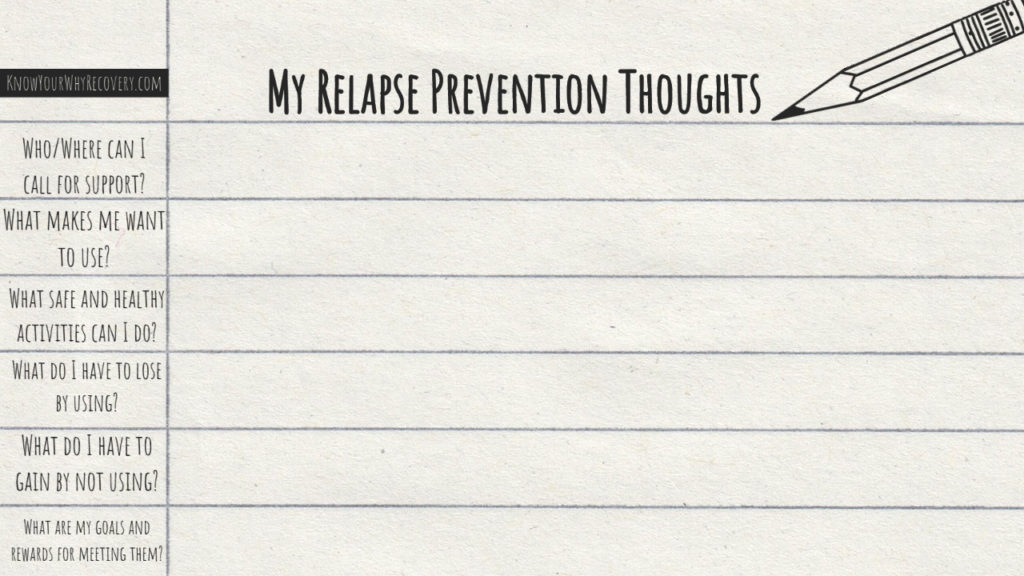Read below for some information on relapse prevention and a free Relapse Prevention Thoughts Cheatsheet based on the video above!
There are a ton of approaches to relapse prevention. One thing is certain…you need to have a plan. Below you will find a prinatble Relapse Prevention Thoughts cheatsheet which serves as a great skeleton for a more comprehensive plan and can function as a “quick reference.” The pdf is printable so you can print and mark it up as much as you need. It is easy to fold this and keep on your person as you never know when you may need it! The cheatsheet refers to “use” but that term could easily be switched with “engage in addictive behavior” or “engage in self-destructive behavior” so feel free to adapt it to your needs.
Here is some further information about the prompts on the cheatsheet:
Who/Where can I call for support? Here you track the people or places you utilize in your support system. You also can write down emergency hotlines or crisis hotlines. Be specific, this is a reference for the people and organizations that can assist you when you may need it most. Be sure to write down the actual phone numbers (just in case your cell goes missing or runs out of battery).
What makes me want to use? This is what is commonly referred to as triggers. What people, places, situations, thoughts, feelings, objects, etc make you feel like you need to engage in addictive behaviors? Again be specific. It is easy to say “people, places, and things” but that is not incredibly helpful. Identify the exact people, places, and things. This si help keep these triggers fresh in your mind for when it comes time to cope with and/or avoid them. Who knows, you may even identifiy some triggers you didn’t think we so common for you.
What safe and healthy activities can i do? Or rather, what rewarding activities can I engage in instead of addictive behaviors? Some common answers may be exercise, reading, go to a meeting, call a friend, meditate, journal, and use mindfulness. What works for YOU. Again, be specific. You are creating a library of possibilities here.
What do I have to lose by using? What are YOUR consequences of engaging in addictive behavior? Do you face jail time? Will it impact finances? Will it erode relationships? Again, we won’t stop saying it, be specific. They must have meaning for you.
What do I have to gain by not using? This is the consequences of avoiding addictive behavior. It may seem odd calling them consequences but essentially what positive outcomes will occur? How will you grow? What good will come to you? Essentially, these may be the reasons for your recovery. Your WHY as we like to call it.
What are my goals and rewards for meeting them? These are the milestones you wish to celebrate (safely). What goals do you have in recovery? What goals do you have in your personal life? You’ll probably see some overlap. Furthermore, when you hit that milestone, how can you reward yourself appropriately? Plan this out. It gives you a reference, keeps you on track with specifics, and gives you somethign to look forward to.
You can download a printable pdf of the Relapse Prevention Thoughts Cheatsheet based on the above graphic in the link below. Give us your feedback! Was this helpful for you?
